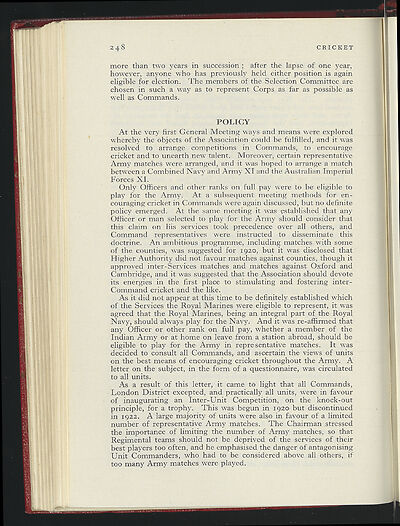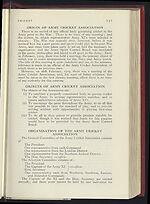1938-39
(266)
Download files
Complete book:
Individual page:
Thumbnail gallery: Grid view | List view

iF"
24.8 CRICKET
more than two years in succession ; after the lapse of one year,
however, anyone who has previously held either position is again
eligible for election. The members of the Selection Committee are
chosen in such a way as to represent Corps as far as possible as
well as Commands.
POLICY
At the very first General Meeting ways and means were explored
whereby the objects of the Association could be fulfilled, and it was
resolved to arrange competitions in Commands, to encourage
cricket and to unearth new talent. Moreover, certain representative
Army matches were arranged, and it was hoped to arrange a match
between a Combined Navy and Army XI and the Australian Imperial
Forces XI.
Only Officers and other ranks on full pay were to be eligible to
play for the Army. At a subsequent meeting methods for en-
couraging cricket in Commands were again discussed, but no definite
policy emerged. At the same meeting it was established that any
Officer or man selected to play for the Army should consider that
this claim on his services took precedence over all others, and
Command representatives were instructed to disseminate this
doctrine. An ambitious programme, including matches with some
of the counties, was suggested for 192o, but it was disclosed that
Higher Authority did not favour matches against counties, though it
approved inter-Services matches and matches against Oxford and
Cambridge, and it was suggested that the Association should devote
its energies in the first place to stimulating and fostering inter-
Command cricket and the like.
As it did not appear at this time to be definitely established which
of the Services the Royal Marines were eligible to represent, it was
agreed that the Royal Marines, being an integral part of the Royal
Navy, should always play for the Navy. And it was re-affirmed that
any Officer or other rank on full pay, whether a member of the
Indian Army or at home on leave from a station abroad, should be
eligible to play for the Army in representative matches. It was
decided to consult all Commands, and ascertain the views of units
on the best means of encouraging cricket throughout the Army. A
letter on the subject, in the form of a questionnaire, was circulated
to all units.
As a result of this letter, it came to light that all Commands,
.London District excepted, and practically all units, were in favour
of inaugurating an Inter-Unit Competition, on the knock-out
principle, for a trophy. This was begun in 192o but discontinued
in
1922
. A large majority of units were also in favour of a limited
number of representative Army matches. The Chairman stressed
the importance of limiting the number of Army matches, so that
Regimental teams should not be deprived of the services of their
best players too often, and he emphasised the danger of antagonising
Unit Commanders, who had to be considered above all others, if
too many Army matches were played.
24.8 CRICKET
more than two years in succession ; after the lapse of one year,
however, anyone who has previously held either position is again
eligible for election. The members of the Selection Committee are
chosen in such a way as to represent Corps as far as possible as
well as Commands.
POLICY
At the very first General Meeting ways and means were explored
whereby the objects of the Association could be fulfilled, and it was
resolved to arrange competitions in Commands, to encourage
cricket and to unearth new talent. Moreover, certain representative
Army matches were arranged, and it was hoped to arrange a match
between a Combined Navy and Army XI and the Australian Imperial
Forces XI.
Only Officers and other ranks on full pay were to be eligible to
play for the Army. At a subsequent meeting methods for en-
couraging cricket in Commands were again discussed, but no definite
policy emerged. At the same meeting it was established that any
Officer or man selected to play for the Army should consider that
this claim on his services took precedence over all others, and
Command representatives were instructed to disseminate this
doctrine. An ambitious programme, including matches with some
of the counties, was suggested for 192o, but it was disclosed that
Higher Authority did not favour matches against counties, though it
approved inter-Services matches and matches against Oxford and
Cambridge, and it was suggested that the Association should devote
its energies in the first place to stimulating and fostering inter-
Command cricket and the like.
As it did not appear at this time to be definitely established which
of the Services the Royal Marines were eligible to represent, it was
agreed that the Royal Marines, being an integral part of the Royal
Navy, should always play for the Navy. And it was re-affirmed that
any Officer or other rank on full pay, whether a member of the
Indian Army or at home on leave from a station abroad, should be
eligible to play for the Army in representative matches. It was
decided to consult all Commands, and ascertain the views of units
on the best means of encouraging cricket throughout the Army. A
letter on the subject, in the form of a questionnaire, was circulated
to all units.
As a result of this letter, it came to light that all Commands,
.London District excepted, and practically all units, were in favour
of inaugurating an Inter-Unit Competition, on the knock-out
principle, for a trophy. This was begun in 192o but discontinued
in
1922
. A large majority of units were also in favour of a limited
number of representative Army matches. The Chairman stressed
the importance of limiting the number of Army matches, so that
Regimental teams should not be deprived of the services of their
best players too often, and he emphasised the danger of antagonising
Unit Commanders, who had to be considered above all others, if
too many Army matches were played.
Set display mode to:
![]() Universal Viewer |
Universal Viewer | ![]() Mirador |
Large image | Transcription
Mirador |
Large image | Transcription
| Games and sports in the army > 1938-39 > (266) |
|---|
| Permanent URL | https://digital.nls.uk/248740064 |
|---|
| Description | 'Games and Sports in the Army' was an annual publication produced by the British War Office between the 1930s and 1960s. This included the Second World War. It outlines the rules and regulations for games and sports played by members of the armed forces. It features names and photographs of team members, and examples of contemporary advertising. |
|---|---|
| Shelfmark | GWB.52 |

